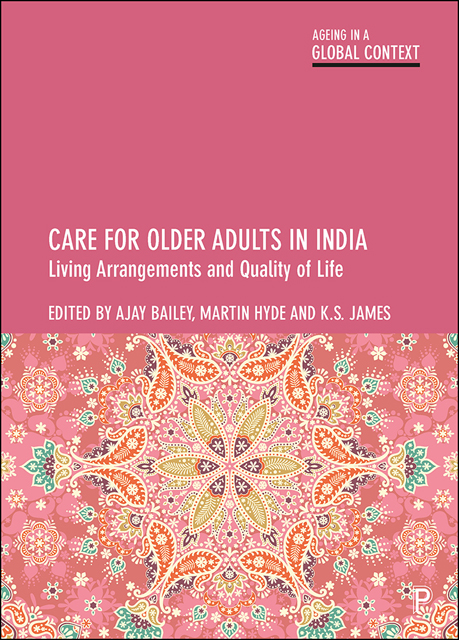Book contents
- Frontmatter
- Contents
- List of figures and tables
- Notes on the editors
- List of contributors
- Acknowledgements
- Series editors’ preface
- Map of India
- 1 Introduction: Living arrangements and care in India
- 2 Theorising care and relationships in the age of migration
- 3 Emerging living arrangements of older adults in India: patterns and welfare implications
- 4 Living arrangement concordance and the well-being of older persons in India
- 5 Family size and living arrangements among older adults in Kerala: panel data analysis, 2004– 19
- 6 Care arrangements for older adults: exploring the intergenerational contract in emigrant households of Goa, India
- 7 All my responsibilities towards my children are over! Linked lives and life course obligations among older adults with migrant children in India
- 8 Interpreting the landscapes of care for older men in Delhi and Kolkata: perspectives from care receivers and caregivers
- 9 The role of cultural meaning system and place attachment in retaining home ownership while residing in retirement homes in Kerala, India
- 10 Decision-making and choice or sine qua non? Care home entry in Tamil Nadu
- 11 Welfare and development programmes for older adults in India
- 12 Lessons and future directions for caregiving research in India
- Index
11 - Welfare and development programmes for older adults in India
Published online by Cambridge University Press: 13 October 2022
- Frontmatter
- Contents
- List of figures and tables
- Notes on the editors
- List of contributors
- Acknowledgements
- Series editors’ preface
- Map of India
- 1 Introduction: Living arrangements and care in India
- 2 Theorising care and relationships in the age of migration
- 3 Emerging living arrangements of older adults in India: patterns and welfare implications
- 4 Living arrangement concordance and the well-being of older persons in India
- 5 Family size and living arrangements among older adults in Kerala: panel data analysis, 2004– 19
- 6 Care arrangements for older adults: exploring the intergenerational contract in emigrant households of Goa, India
- 7 All my responsibilities towards my children are over! Linked lives and life course obligations among older adults with migrant children in India
- 8 Interpreting the landscapes of care for older men in Delhi and Kolkata: perspectives from care receivers and caregivers
- 9 The role of cultural meaning system and place attachment in retaining home ownership while residing in retirement homes in Kerala, India
- 10 Decision-making and choice or sine qua non? Care home entry in Tamil Nadu
- 11 Welfare and development programmes for older adults in India
- 12 Lessons and future directions for caregiving research in India
- Index
Summary
Introduction
The problems and issues faced by India's older population are receiving considerable attention by the government of India. Though concern for the welfare of older adults was recognised from the Third Five-Year Plan onwards, a national old age pension scheme was only initiated by the central government in 1995 during the Eighth Five-Year Plan period. The National Policy for Older Persons (NCOP, 1999), formulated by the Ministry of Social Justice and Empowerment, strengthened government resolve to address the issue effectively. The policies and programmes acknowledge the need to address varied issues for older adults and various attempts have been made to revise the policy for to meet the changing needs of the ageing population in India. Undoubtedly, the existing social security schemes have contributed to improving the quality of life of the older adults, especially those who live below the poverty line. Given the vulnerable sections of older population, such as those who are living below poverty line (BPL), widows, those living with a disability, those working in the informal sector and other marginalised groups, the focus of the government is mainly on delivering welfare by attempting to address their basic needs such as food, clothing and shelter. Accordingly, the governments at central and state levels have programmes and schemes such as the old age pension, widowhood pension, provision for older adults to stay in government sponsored old age homes and other such welfare-oriented measures. This chapter maps the various schemes provided by the government of India for older adults and other schemes which are also open for older adults. In addition to listing these issues the chapter goes a step further to discuss the barriers in accessing these schemes.
However, concerns persist about the awareness among both the community and potential beneficiaries, as well as issues of the accessibility, implementation, utilisation and effectiveness of the programmes (Prasad et al, 2013; UNFPA, 2012). The Building Knowledge Base on Population Ageing in India (BKPAI) study (2011) shows that, in Maharashtra, over two-thirds of the older adults surveyed were aware of the Indira Gandhi National Old Age Pension Scheme (IGNOAPS); and two-thirds of older women were aware of the Indira Gandhi National Widowhood Pension Scheme (IGNWPS), compared to 57 per cent of older men.
- Type
- Chapter
- Information
- Care for Older Adults in IndiaLiving Arrangements and Quality of Life, pp. 210 - 226Publisher: Bristol University PressPrint publication year: 2022
- 1
- Cited by



